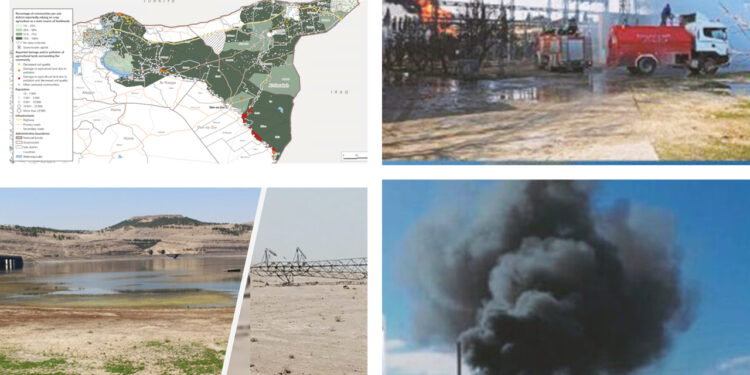Kurdish-led North and East Syria (NES) faces worsening disaster driven by Turkish air strikes, pollution, and destruction of basic infrastructure, the UN-backed REACH initiative has found.

Turkish airstrikes against civilian infrastructure, oil leaks and lack of access to clean drinking water are worsening the humanitarian catastrophe in Kurdish-led North and East Syria, according to a report by the UN-supported humanitarian initiative REACH.
The overview of the crisis in the region, which has recently faced waves of Turkish airstrikes specifically intended to degrade the region’s crucial energy infrastructure, found:
“North and East Syria faced increased fuel shortages, especially in the Al-Hasakah Governorate where the unavailability of fuel reportedly affected the access to electricity in 50% of assessed communities.
“The growing unavailability of fuel is one of the consequences of the damage to civilian infrastructure caused by repeated airstrikes in North and East Syria.”
The research, which was based on interviews in over a thousand local communities throughout the multi-ethnic autonomous region, identified a wide range of needs among both internally displaced people (IDPs) and their host communities, including urgent needs for repairs to infrastructure, access to basic supplies like cooking fuel and medicine, and access to education and hygiene facilities.
The report particularly spotlighted the environmental crisis in the region, also driven by over a decade of war, the region’s isolation, and its forced reliance on unsafe indigenous diesel manufacture to maintain a basic standard of humanitarian provision.
“While most of communities in North and Easy Syria rely on crop agriculture for livelihoods, farmers faced issues related to decreased soil quality and damage to agricultural lands due to pollution,” REACH stated.
In particular, the survey found pollution posed a threat in the Deir-ez-Zor region, home to most of North and East Syria’s oil infrastructure: “Reports of land pollution were the highest in communities located along the Euphrates River in the Deir-ez-Zor governorate. Cropland pollution may have resulted from recent oil leaks in several rivers in the region.”
Access to water is also a particular issue faced in the region. Ongoing desertification is compounded by Turkey’s control of crucial water resources. Turkish-backed armed groups have repeatedly closed off the flow from the Allouk water station, leaving hundreds of thousands of locals without access to drinking water, while Turkey is also accused of siphoning the water flow through the crucial Euphrates river, leaving local communities and farmers unable to access the water they need.
As such, REACH found, “More than half of the assessed communities in Deir-ez-Zor and Al-Hasakah Governorate reportedly faced problems with drinking water. Problems include water having a bad colour, bad taste, water being calcareous or more severe issues such as making people sick. In March, Deir-ez-Zor was the governorate recording the greatest reports of water making people sick.”
Aid to Syria has rapidly declined in recent years as global attention turns elsewhere, though there are more Syrians in need of humanitarian aid now than at any time since the conflict began, according to the World Health Organisation. The crisis is particularly acute in North and East Syria, an unrecognised region subjected to regular Turkish airstrikes, invasions, and economic embargo, which means very little aid can access the region.
REACH is a joint initiative of IMPACT, ACTED and the United Nations Operational Satellite Applications Programme (UNOSAT), working to implement aid provision in crisis zones including North and East Syria. Their regular reports highlight the multiple, intersecting crises faced in the region.








Leave A Comment